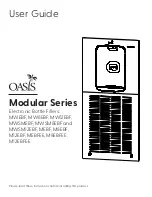
5. Insert the blue product water tube into the quick connecting fit-
ting on the bottom of the RO faucet. The tube should slide into
the fitting about 5/8”. If you have a TDS monitor, slide the nut on
the bottom of the TDS monitor down onto the tube before
inserting the tube into the bottom of the white flow switch. Slide
the nut back up the tube onto the white flow switch and hand
tighten. DO NOT OVERTIGHTEN.
6. Remove the brass compression nut from the Cold Water Saddle
Valve. Slide the nut over the end of the white plastic tube coming
from the inlet to the Pre-filters. Discard the brass compression
sleeve. Slide the plastic compression sleeve provided (in the bag
with the Cold Water Saddle Valve) onto the tube and push the
brass insert provided into the end of the tube (see Figure 7).
7. Push the end of the white tube into the port on the Cold Water
Saddle Valve until it seats; tighten the compression nut firmly
with a wrench. Do not overtighten.
8. Insert the 1/4” yellow tube into the quick connecting fitting on
the storage tank valve. It should go in about 5/8”.
NOTICE:
Make sure that the storage tank valve is still open.
TDS MONITOR WITH
MODEL RO2000-TDS INSTALLATION
NOTICE:
Your RO unit will probably remove about 75% of your
water supply’s TDS. Your municipal water supply should be able to
test your supply water for TDS. If not, they can tell you where to get
it tested.
If you want to start using your RO water prior to having this test per-
formed, start with the Selector Switch No. 6 inside the monitor box set
to ON. This will warn you if the TDS level in your RO product water
approaches 1/2 the maximum allowable EPA level of 500 ppm TDS.
If you wish, you can also start with Switch No. 6 and, if the LED is
consistently green, change to No. 5 after a few days, then to No. 4.,
etc., until you reach a switch where the LED turns amber. Then go
back to the switch at the next highest set-point (For example, if the
LED is amber when Switch No. 3 is ON (90 ppm TDS), go back to
Switch No. 4 (120 ppm TDS), and leave the unit on that set-point.
When the LED changes to amber, it is time to service the unit.
While the system above will work, having your supply water tested
will assure you that your RO unit is in fact performing as designed.
1. Mount the TDS monitor in a convenient location on the wall by
the self-adhesive hook-and-loop pad on the back of the monitor.
Be sure that the connection ports on the electronics enclosure
face
down
.
2. Run the grey telephone-style cable with the yellow plug from the
RO faucet to the right-hand (yellow) port on the TDS Monitor.
3. Run the grey telephone-style cable from the white flow switch to
the left-hand port on the TDS Monitor.
4. Remove the lid from the monitor and install a 9-volt battery (pur-
chase separately). Use a pointed object (such as a bent paper clip)
to set
one
of the six selector switches as shown in Table 1.
FLUSHING THE SYSTEM PREFILTERS
NOTICE: Please flush the prefilters before installing the RO
membrane into its housing.
1. Make sure that both of the prefilter cartridges are installed
correctly in the blue tanks and that the tanks have been hand
tightened.
2. Hook up the system as illustrated in Figures 5 and 6 and as indi-
cated in the instructions. See the owner’s manual.
3. Connect the white tubing from the inlet side of the TO1 car-
tridge housing to the Cold Water Saddle Valve.
4. Make sure that all of the tubing connections have been made on
the system and that the RO membrane tank cap has been
installed hand tight.
5. Close the valve on the top of the storage tank and open the RO
faucet on the sink.
6. Turn on the water on the cold water supply valve and then turn
on the Cold Water Saddle Valve. Check the system for leaks.
7. Flush the system for a minimum of 30 minutes or until you
notice that no more dark carbon fines or particles are coming
out of the RO faucet.
8. After you have completed the flushing process turn off the water
on the Cold Water Saddle Valve.
9. Close the RO faucet on the sink after the water has stopped run-
ning and open the valve on the storage tank.
10. Open the RO membrane housing and drain the water out of the
housing.
11. Install the RO membrane per the instructions in the following
section.
MEMBRANE INSTALLATION
1. The RO Membrane has two O-Rings at one end. Cut the mem-
brane bag at that end (see Figure 8).
Be very careful not to
damage the membrane.
3
Switch ON
Amber Light ON
Is No.
if TDS Above
1
30 PPM
2
60
3
90
4
120
5
150
6
250
Table 1:TDS Monitor Switch settings and TDS Levels
Discard Brass
Compression
Sleeve
Use Plastic
Compression
Sleeve from
Kit
Install Brass
Insert from
Kit
Slide Compression Nut
up Tube
1
2
3
3635 0100
Figure 7: Replace compression sleeve and install insert in
tube.
3636 0100
Figure 8: Cut the membrane bag at the end of the membrane
with the 2 O-Rings. Do not damage or touch the membrane!
CAUTION: Do not touch the membrane with your hands.
Always use the bag to lift the membrane.




































